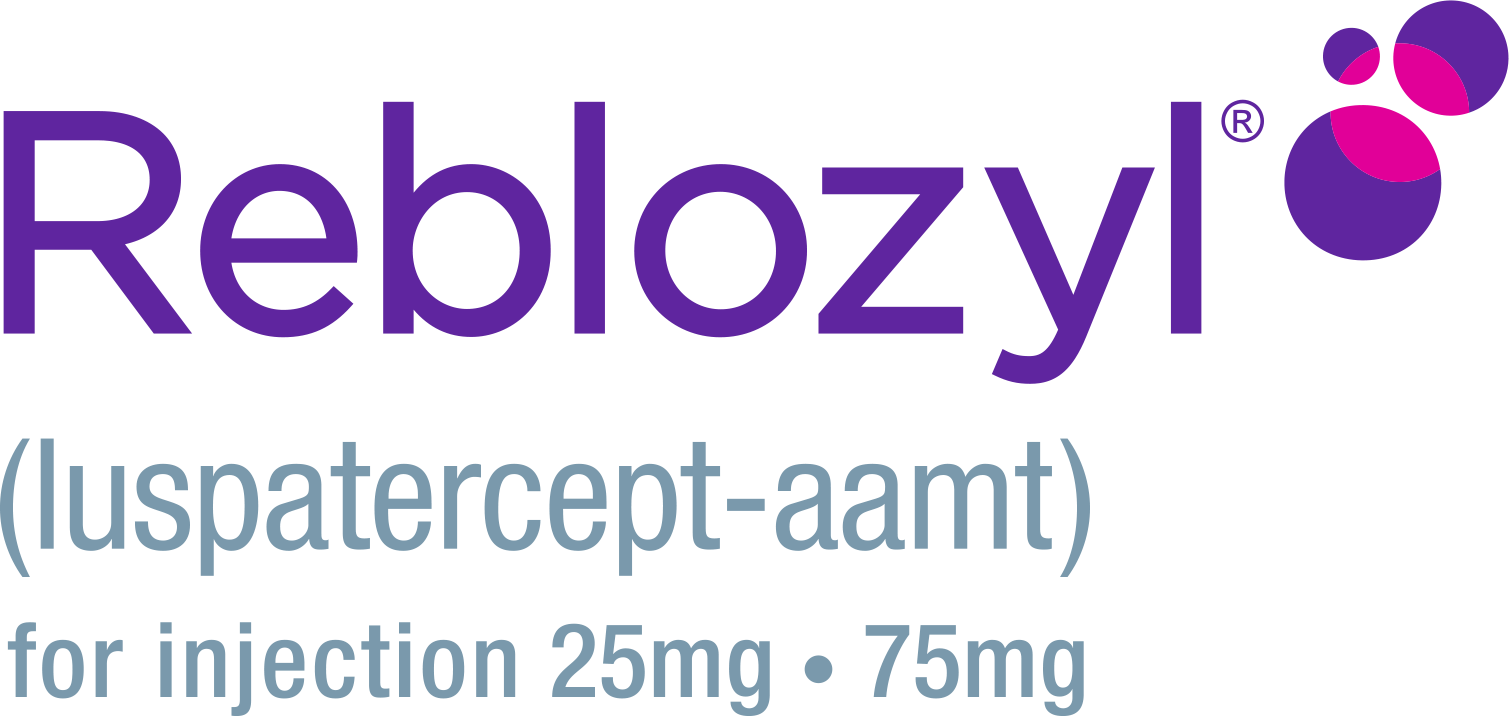First-line treatment results for REBLOZYL
In a clinical study that compared REBLOZYL and epoetin alfa, an erythropoiesis-stimulating agent (ESA), REBLOZYL worked better for more people than epoetin alfa did. In this study, 356 people with very low- to intermediate-risk MDS who had not been treated with an ESA and required regular red blood cell (RBC) transfusions were randomized to receive REBLOZYL (178) or epoetin alfa (178). People received 1 REBLOZYL injection every 3 weeks or 1 injection of an ESA every week over 24 weeks. Dose increases and best supportive care that included RBC transfusions were allowed.
The main goal of the study was to see how well REBLOZYL and epoetin alfa could raise hemoglobin (Hgb) levels by at least 1.5 g/dL and stop the need for RBC transfusions for at least 12 weeks.

Another goal of the study was to see how well REBLOZYL and epoetin alfa could eliminate the need for RBC transfusions for at least 12 weeks.
With REBLOZYL 2/3 OF PEOPLE HAD NO RBC TRANSFUSIONS for at least 12 weeks

People who achieved transfusion independence on REBLOZYL REMAINED TRANSFUSION-FREE FOR ALMOST 2.5 YEARS

The median time that people went without RBC transfusions after responding to REBLOZYL or epoetin alfa.
This clinical study set out to determine how likely it was for participants to be transfusion-free for at least 12 weeks. This study didn’t set out to compare the most common length of time of transfusion independence.
These were not the only goals and evaluations of the study.

356 PEOPLE
with very low-, low- or intermediate-risk myelodysplastic syndromes (MDS) or myelodysplastic/myeloproliferative neoplasms with ring sideroblasts and thrombocytosis (MDS/MPN-RS-T) who have never received treatment with an ESA and who require regular RBC transfusions.

178 PEOPLE
received 1 REBLOZYL injection every 3 weeks; 86 of them achieved the main goal of the study
178 PEOPLE
received 1 epoetin alfa injection every week; 48 of them achieved the main goal of the study
People in both treatment groups were allowed to receive the best supportive care. This included RBC transfusions as needed.
To be included in the study, people needed to:
- Be over the age of 18
- Have been diagnosed with lower-risk MDS
- Have had a blood test that shows low levels (<500 U/L) of a protein called erythropoietin
- Receive RBC transfusions of 2 to 6 units for a minimum of 8 weeks leading up to the start of the study
People could not be a part of the study if they had:
- Received previous treatment for their anemia
- Received treatment for their underlying MDS
- A specific mutation in their DNA (deletion 5q)
REBLOZYL provided strong, lasting responses in MDS-related anemia
What are the possible side effects of REBLOZYL?
It’s important to know about the possible side effects of REBLOZYL before beginning treatment. Remember: People may react to medicines differently, and that’s expected.
The possible side effects of REBLOZYL are well studied. In the study, most side effects were considered mild or moderate. Less than 5% of people had to stop treatment with REBLOZYL based on side effects.
Be sure to talk with your healthcare team about what to expect when starting treatment with REBLOZYL.
What are the serious side effects of REBLOZYL?

Serious side effect
A serious side effect is a side effect that can sometimes become life-threatening and can lead to death. They may happen any time during treatment or even after your treatment has ended. You may experience more than one side effect at the same time.

Blood clots (sometimes called thrombosis or thromboembolism)
Blood clots in the arteries, veins, brain, and lungs have happened in people with beta thalassemia during treatment with REBLOZYL. The risk of blood clots may be higher in people who have had their spleen removed or who take hormone replacement therapy or birth control pills.
Call your healthcare provider or get medical help right away if you have any of these symptoms:
- Chest pain
- Trouble breathing or shortness of breath
- Pain in your leg, with or without swelling
- A cold or pale arm or leg
- Sudden numbness or weakness that is short term or continues to happen over a long period of time, especially on one side of the body
- Severe headache or confusion
- Sudden problems with vision, speech, or balance (such as trouble speaking, difficulty walking, or dizziness)

Hear from someone who has managed MDS-related anemia with REBLOZYL.

Get tips and tools to take a more active role in your treatment journey
Your REBLOZYL Connection™ is an educational program designed to help you understand treatment with REBLOZYL and provide resources so you can take a more active role in your care.

High blood pressure (sometimes called hypertension)
REBLOZYL may cause an increase in your blood pressure. Your healthcare provider will check your blood pressure before you receive your REBLOZYL dose. Your healthcare provider may prescribe you medicine to treat high blood pressure or increase the dose of medicine you already take to treat high blood pressure, if you develop high blood pressure during treatment with REBLOZYL.
What are the most common side effects of REBLOZYL?
The most common side effects are the side effects that were the most frequently reported by patients in the study. You may experience more than one side effect at the same time.
The most common side effects of REBLOZYL include:
- tiredness
- headache
- back, joint, muscle, or bone pain
- joint pain
- dizziness
- nausea
- diarrhea
- cough
- stomach (abdominal) pain
- trouble breathing
- swelling of your hands, legs, or feet
- high blood pressure
- allergic reactions
These are not all of the possible side effects. For more information about side effects, please see the REBLOZYL Patient Information.
Call your doctor for medical advice about side effects. You may report side effects to the FDA at 1-800-FDA-1088.



